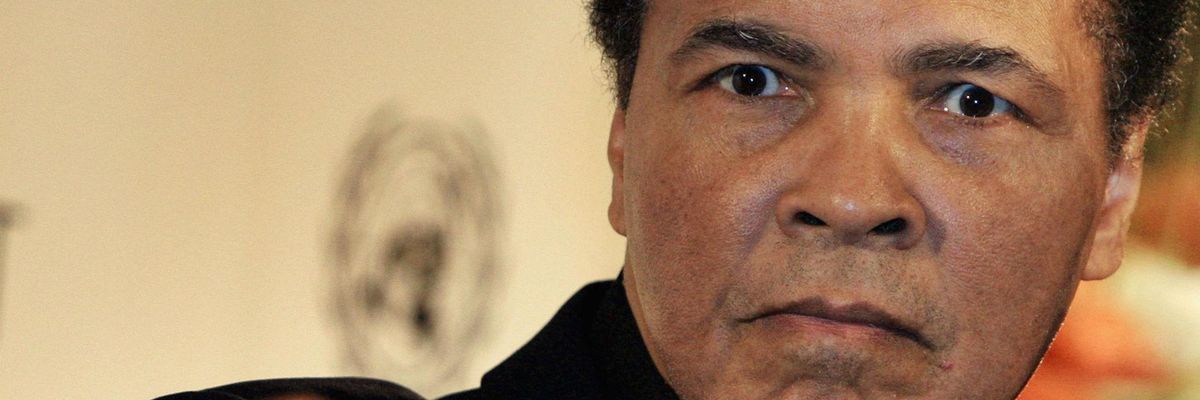"Everything I did was according to my conscience. I wasn't trying to be a leader. I just wanted to be free." - Muhammad Ali (1942-2016)
In the end, Muhammad Ali wasn't just the most important athlete of his time. And he wasn't just a world-changing activist. He was even more than those things: he was a unified human being. His occupation was inseparable from his aspirations, his spiritual ideals inseparable from his worldly activities.
That's an important lesson for any historical moment, and for this moment more than most.
Today we are experiencing a global activist wave, the likes of which hasn't been seen since the 1960s. Here in this country, the Black Lives Matter movement has become a powerful force for change. Sen. Bernie Sanders has energized millions of Americans across demographic lines, especially millennials of all races and backgrounds. Labor efforts like the drive for a $15 minimum wage, and movements for the rights of LGBT people and other oppressed communities, are gaining force and winning victories.
But, as in the 1960s, there is fragmentation and sometimes friction among these freedom movements. This can and must be overcome. That's why Bernie Sanders has reached out to social justice groups with considerable success. It's why efforts like the labor-based Fight for $15 and the successful drive for paid leave in Minneapolis are turning to people of color for leadership.
Muhammad Ali bridged a major divide when he refused induction into the armed forces. The civil rights and anti-war movements of the 1960s were often divided by race, kept apart by those who were afraid of losing hard-won gains and by cynics who knew that to divide is to conquer. That division was always artificial, especially since African Americans were disproportionately fighting and dying in Vietnam.
After he was suspended from boxing, Ali spent three years speaking to college students and other groups of all races about both civil rights and Vietnam. When Dr. King came out against the war despite fierce opposition, he cited him, saying:
"Like Muhammad Ali puts it, we are all - black and brown and poor - victims of the same system of oppression."
Ali sometimes said intemperate things, especially in those early days. As a fighter, he could be as brutal as he was beautiful. (Ask Ernie Terrell.) But there is a reason he was so beloved, and it can be summed up in one word: "Integrity."
That word means honest, just, fair, and incorruptible. It also means "unified." It comes from the same Latin root as "integer," meaning "intact" and indivisible like the units that make up numbers. There are no changeable or hidden parts. What you see is what you get.
Muhammad Ali never claimed to be political. His activism wasn't a career choice. When he spoke out on civil rights, when he refused the draft, he was being true to his deepest ethical core.
"I don't have to be what you want me to be," he said. "I'm free to be what I want."
That was an affirmation of every person's right to pursue their own happiness and fulfill their own potential. This independence of spirit freed an entire generation of athletes, artists and professionals to express their own beliefs in the public arena. Some of them showed the same courage Ali showed, and some paid the same high price for their convictions.
Ali was not afraid to be, as Dave Zirin describes him, "dangerous." He could not have accomplished what he did without a willingness to shock and provoke some of the same people who are lionizing him today - in New York, Washington, and Louisville.
When Ali crossed the political gulf that divided the left of the 1960s, he also crossed the false line separating "political people" from the rest of us. He showed us that we are all political. Some of us declare our politics by taking brave stands. Some of us declare our politics with our inaction, our silence, and our fear.
This is a time for coming together and healing divisions. It sounds melodramatic, but it's true: there's no time to lose. The planet is in danger. The trend toward economic and political oligarchy could soon become irreversible. Children of color are dying every day - at gunpoint, from hunger, and for lack of proper health care. Women are being brutalized and denied autonomy in boardrooms, bedrooms, and medical clinics.
Some people will try to keep us divided. Wall Street-funded groups and politicians will keep trying to tell us that there are people called "Bernie Bros" who don't understand social issues, and that people who fight for social justice don't understand or care about class divisions. They'll say that our interests aren't aligned, that a victory for one is not a victory for all.
It's a lie. We are all - black and brown and poor and young and gay and female - victims of the same system of oppression. The needs of each are part of a common struggle, one that's inseparable from our daily lives and occupations. We need to make the fight for a better world part of our everyday existence, just as Ali did.
You can call it 'activism' or you can call it 'integrity.' Whatever you call it, Muhammad Ali still speaks to activists everywhere through his words and his example. It is a gift that cannot die, and we love him for it.

